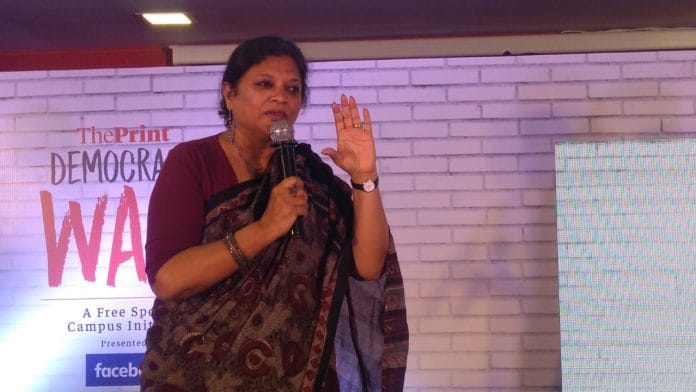Speaking at Democracy Wall, Kapoor, also a filmmaker, says the biggest challenge to the growth of community radio is the administration itself.
New Delhi: The government wants to reach out to people through the medium of the community radio, but doesn’t want it to influence and empower them, social activist and founder of Radio Mewat Archana Kapoor said Thursday.
Kapoor, also a filmmaker, said the government does not readily lend voices to the grassroots community. “The biggest challenge to community radio’s growth is the administration and the government itself,” she said.
Kapoor was in conversation with Manasi Phadke, associate editor at ThePrint, at the seventh edition of Democracy Wall.
Democracy Wall is a monthly free speech campus initiative organised by ThePrint in collaboration with Facebook. The seventh edition of the event at KC College, Mumbai, featured Kapoor, rapper Kekho Thiamkho, actor Divya Dutta, Mumbai Congress president Sanjay Nirupam and stand-up comedian Abijit Ganguly.
There is fear among government officials about the empowerment of the community, Kapoor said. “I have been threatened for running a community radio station in Mewat. I have been called by the district collector and told to remove people because they become very powerful and empowered.”
Community radio
Kapoor said that a community radio station is for, of and by the people who come together to discuss and address issues related to the community. It is a way to bring the voices of the minorities, the tribal communities, women and the underrepresented to the forefront.
“Community radios are owned, operated and influenced by the community hold up a democratic spirit,” she added.
On 9 February 1995, in a Supreme Court ruling by justices P.B Sawant and S. Mohan, air waves were declared public property. However, the first community radio in India, Sangham radio, came up in Andhra Pradesh only as late as 2008.
According to the I&B Ministry data, there are 217 operational community radio stations in India as of 21 May 2018.
Highlighting the red-tapism involved in starting a radio station, Kapoor said 16 steps are required in securing a license for a community radio station. Of those, 10 procedures have to be undertaken by government authorities.
Filtering information
When asked about the problem of possible advocacy of violence and discrimination through community radio, Kapoor said self-regulation was an integral part of the system.
“The community is guided by an unwritten code of ethics,” said Kapoor.
Additionally, community radio is also guided by the code of ethics of the All India Radio. So, there is no need for a fear of misuse of the platform, she said.
The activist also said that while air frequencies were being blocked by the government, television and the internet nevertheless spread messages which are potentially damaging to the society.
“Why fear only the community radio and not the internet which is promoting every other misogynist views and unfiltered comments?” asked Kapoor.
She added regulations are in place to ensure all content aired on the radio be recorded and kept for a minimum of three months. In case of any complaints or discrepancies, they are to be revisited as a source of evidence.
Kapoor advocated that areas in Jharkhand, Chhattisgarh, Kashmir valley and the Nepal border also be issued licenses to run radio stations as people there were as much a part of the Indian democracy as the rest of the country.







Rightly said.